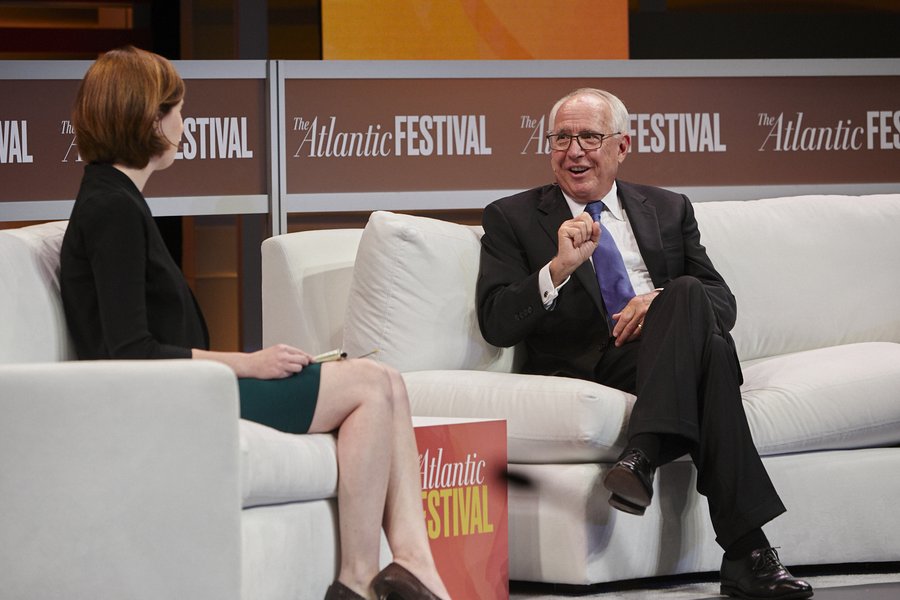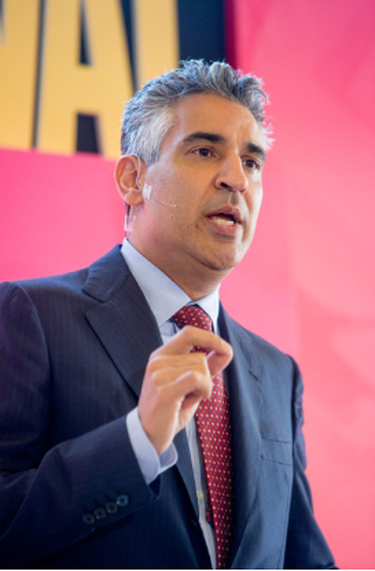
Innovators, journalists, and thought leaders in technology, politics, business, and the arts came together this week for the 10th annual Atlantic Festival to debate some of the most consequential issues of our time. Not surprisingly, health care was a much-discussed topic at several panel discussions during the event, which featured AAMC President and CEO Darrell Kirch, MD, and Executive Vice President Atul Grover, MD, PhD, along with an AAMC-sponsored session on addressing the opioid epidemic. Here are some of the festival’s health care highlights.

The equity of health
How can patients – especially the chronically disadvantaged – navigate an often confusing and costly health care system? That was the tough question at the center of the Equity of Health session, which kicked off the festival. Panelists touched on topics from expanding access to health care through telemedicine to the social determinants of health. Seema Verma, administrator for the Centers for Medicare and Medicaid Services, said one of the answers lies outside the doctor’s office. “It’s about more than a health care card,” Verma said. “It’s about giving people tools they need to improve their health. Community engagement programs must look at the bigger picture like providing jobs and other good things in the community.”
Preparing the physician of the future
In an interview with Jennifer Haberkorn, congressional reporter for the Los Angeles Times, AAMC President and CEO Darrell G. Kirch, MD, discussed critical issues on the minds of many in academic medicine, including the physician shortage that continues to put a massive strain on the health care system. “Baby boomers are going to be aging, they’re going to be living with more medical problems, and they’re going to be living longer,” Kirch said. He warned that this “silver tsunami” will collide with the physician shortage, which he said is exacerbated by a cap on federal funding for residencies. “We don’t have physicians sitting on a shelf somewhere,” he told an audience of more than 800 attendees. “It’s never too late, but it requires action now.” Kirch also said there is hope for the discombobulated electronic medical record system – which has doctors spending 20% of their time entering data – and he predicted that doctors of the future will have “friendly robot” assistants to help them with the task. “Rather than go back to the dark ages of paper records, I think there’s great potential,” he said.
The future of personalized medicine
Researchers have spent decades unlocking the human genome to find new treatments and cures for deadly diseases. Francis S. Collins, MD, director of the National Institutes of Health, gave audience members a glimpse into the progress that has been made in the last 20 years and the work left to be done. “In 2000, we didn’t know what the architecture of the genetic contributions to disease were going to look like,” Collins said. “The complexity of the genetic contribution is considerable.” Now that scientists can analyze a cancer’s DNA and move away from a one-size-fits-all approach, the treatment options have expanded – but there is still a desperate need for more therapies, he explained. “Every cancer has something that’s driving the good cells to go bad. We don’t yet have targeted therapy for every kind of genetic change you find in a cancer,” he said. “The number of drugs is growing, but it’s not big enough and that’s the limitation.” The most effective cures and treatments will likely involve multipronged approaches and more refined immunotherapies to help the immune system harness its own powers to fight disease.

Combating a crisis: Opioids in America
An AAMC-sponsored session on the deadly opioid epidemic in the United States took on a deeply personal tone, as panelists and speakers shared stories of friends and loved ones who have suffered from addiction. U.S. Surgeon General Jerome Adams, MD, MPH, shared a story of his brother, who was sentenced to 10 years in prison for stealing $200 to feed his addiction. Adams stressed the importance of medical and psychological intervention rather than punitive action – doing the math of his own brother’s sentence before the audience, he said it would be far less costly to provide him treatment than to imprison him. A more treatment-based approach should be supported “not because it tugs at your heart strings, but because it makes financial sense,” he said.
AAMC Executive Vice President Atul Grover, MD, PhD, spoke about how little was known about addiction when he began his medical career. He remembered his days as a resident treating overdose patients in San Francisco, California, in the 1990s, when “our job was to give them Narcan and make sure they were breathing, save their lives, and send them out the door.” He, like many of the other speakers, drew a personal connection to addiction – his 16-year-old son has lost acquaintances to unintentional overdoses. “It’s taken some time for our knowledge base to evolve,” he said. “And it’s still evolving.”Medical schools and teaching hospitals are working hard to educate the next generation of physicians in pain management and treatment of those with substance use disorder. Medication-assisted treatments are quite effective in helping patients overcome their addiction to opioids, added Nora Volkow, director of the National Institute on Drug Abuse, but too few patients have access to those treatments.